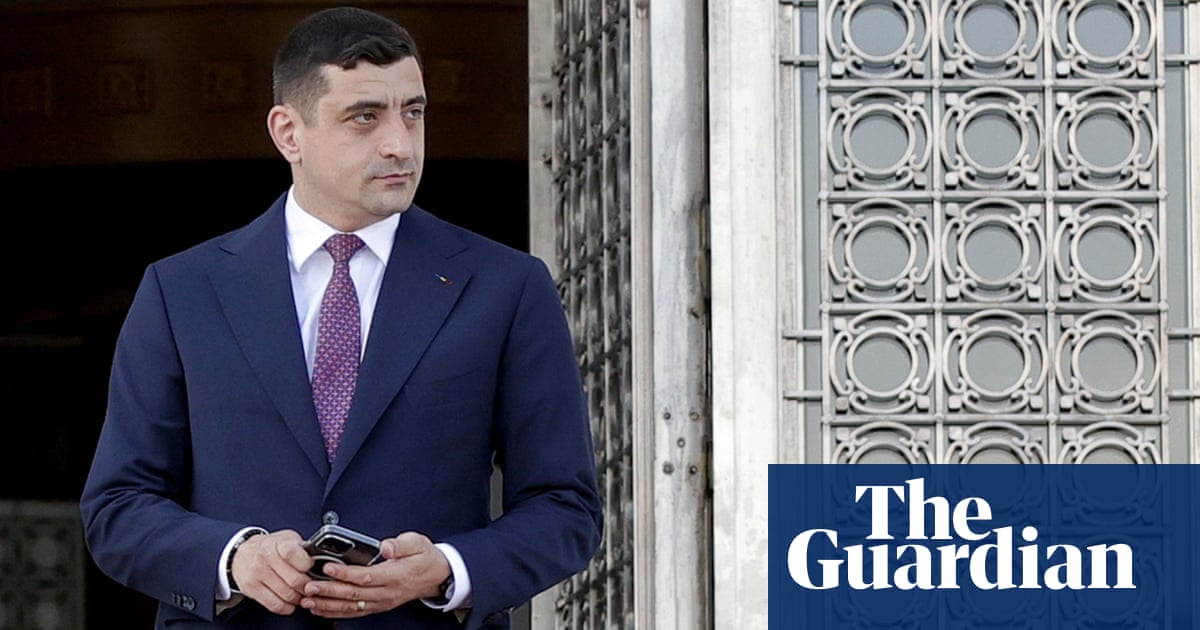An ultranationalist who opposes military aid toUkraine, has vilified the EU’s leaders, and calls himself Donald Trump’s “natural ally” has won the first round of Romania’s rerun presidential vote and will face a centrist in the run-off, early estimates predict.
Initial projections after polling stations closed on Sunday showed George Simion, whose far-right Alliance for the Union of Romanians (AUR) began as an anti-vax movement during the pandemic, comfortably in the lead on between 30% and 33% of the vote.
Neck-and-neck in second and third places were the centrist candidates Nicușor Dan, the mayor of Bucharest, and Crin Antonescu, a veteran former senator, on 21%-23%, with the nationalist former prime minister Victor Ponta trailing on 14.7%.
The two highest-scoring candidates are scheduled to face each other in a second-round run-off on 18 May, nearly six months after the original ballot was cancelled amid evidence of an alleged “massive” Russian influence campaign.
The projections are based on votes cast until a couple of hours before polling stations closed at 9pm local time, and do not take into account the votes of Romania’s very large diaspora, which can represent up to 10% of all ballots.
A far-right victory could lead to Romania – which shares a border with Ukraine and is a member of the EU andNato– veering from its present pro-western path and becoming another disruptive force within the bloc and the transatlantic defence alliance.
It would also be welcomed by conservative nationalists inEuropeand beyond, including senior Trump administration figures such as the US vice-president, JD Vance, who accused Bucharest of denying democracy after the original ballot was cancelled.
That vote waswon by Călin Georgescu, a far-right, Moscow-friendly independent who declared zero campaign spending. It wasannulled by Romania’s top courtafter declassified intelligence documents revealed an alleged Russian influence operation.
In February, Georgescu, who denies any wrongdoing, wasplaced under investigationon counts including misreporting campaign finances, misuse of digital technology and promoting fascist groups, and in March he wasbarred from standing in the rerun.
Romania’s president has a semi-executive role with considerable powers over foreign policy, national security, defence spending and judicial appointments. They also represent the country on the international stage and can veto important EU votes.
Anti-establishment sentiment is running high in Romania, where median household income is a third of the EU average. More than 30% of its 19 million people are at risk of poverty and social exclusion, and nearly 20% of the workforce is working abroad.
Casting his ballot alongside Georgescu in the capital, Bucharest, on Sunday, Simion, 38, said the pair had “one mission only: the return to constitutional order, the return to democracy. I have no other goal than first place for the Romanian people.”Georgescu, 63, called the vote rerun “a fraud orchestrated by those who have made deceit the only state policy”, but said he was voting to “acknowledge the power of democracy, the power of the vote that frightens the system, that terrifies the system”.
Dan, a 55-year-old mathematician and former anti-corruption activist who founded the Save Romania Union party (USR), is running on an independent, pro-EU “Honest Romania” ticket. He said he voted “for hope and a new beginning” for Romania.Antonescu, 65, whose presidential run is backed by the ruling Social Democratic party (PSD) and centre-right National Liberal party (PNL), said he was voting for “a united Romania, for a strong Romania, for a dignified Romania”.
Sign up toHeadlines Europe
A digest of the morning's main headlines from the Europe edition emailed direct to you every week day
after newsletter promotion
Polls are not highly reliable in Romania but several have suggested Simion could beat Dan in a run-off, but would face a harder race against Antonescu.
Simion has described himself as “more moderate” than Georgescu but has repeatedly insisted on Romania’s “sovereignty”, and called for the country’s pre-second world war borders to be restored by Moldova and Ukraine, from both of which he is banned.
In contrast to Georgescu, Simion has frequently denounced Russia, while lashing out at Brussels and praising Trump’s Republicans in the US. He has said he aims to set up an alliance of countries within the EU “in the spirit of Maga”.
He said on Sunday that he aimed to bring Georgescu into government if he won. “There are several ways in which, if the Romanian people want, Mr Georgescu can be in our country’s leadership, and we will use it,” Simion said. “We can form a majority and have him as a prime minister, we can have snap elections or call for a referendum.”
Romania held parliamentary elections in December, with Simion’s AUR and other far-right groups winning 35% of seats.
A snap election can be triggered if MPs reject two proposed governments within the space of 60 days. Experts have said this is unlikely since it has never happened before, and for the time being at least, the ruling centrist coalition appears united.
If he is elected, Simion has said he would make public the records of meetings that led to the original election being cancelled, and also reveal “how much we have contributed to the war effort in Ukraine, to the detriment of Romanian children and our elderly”.
